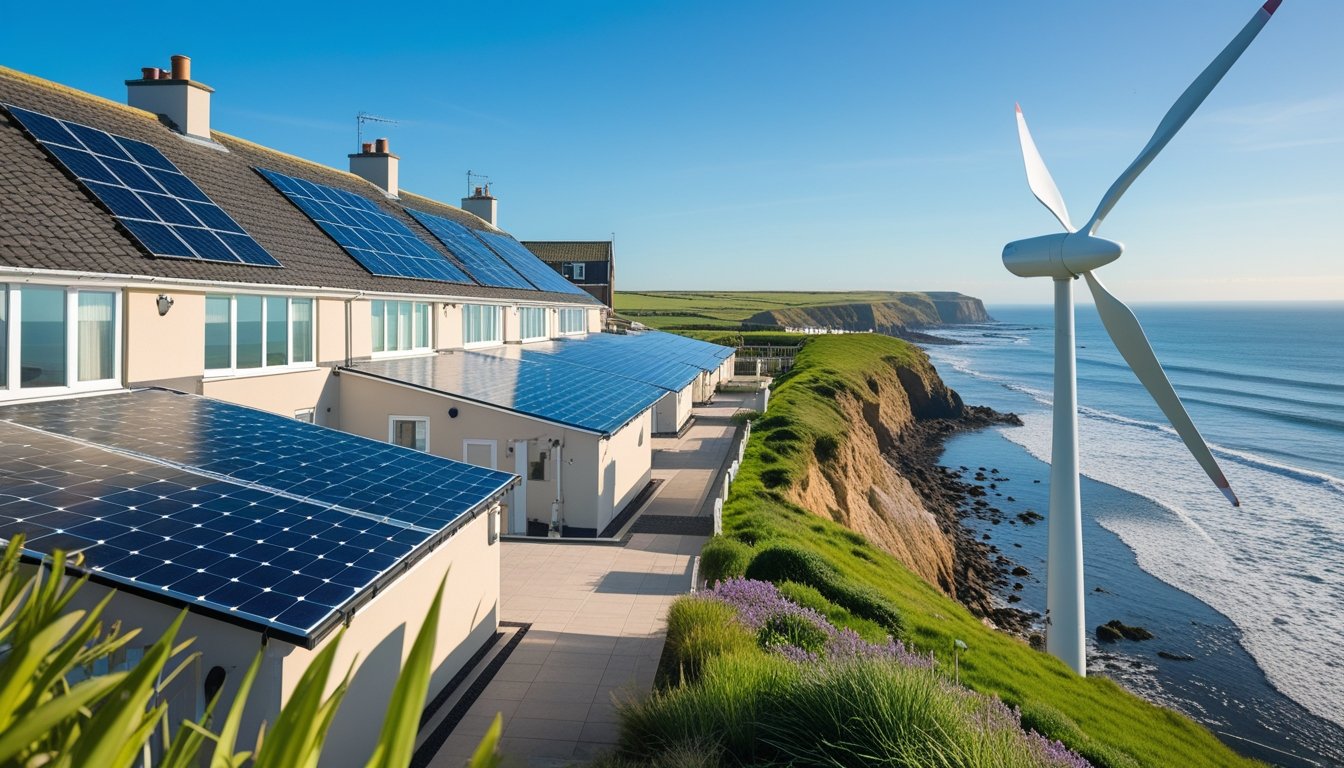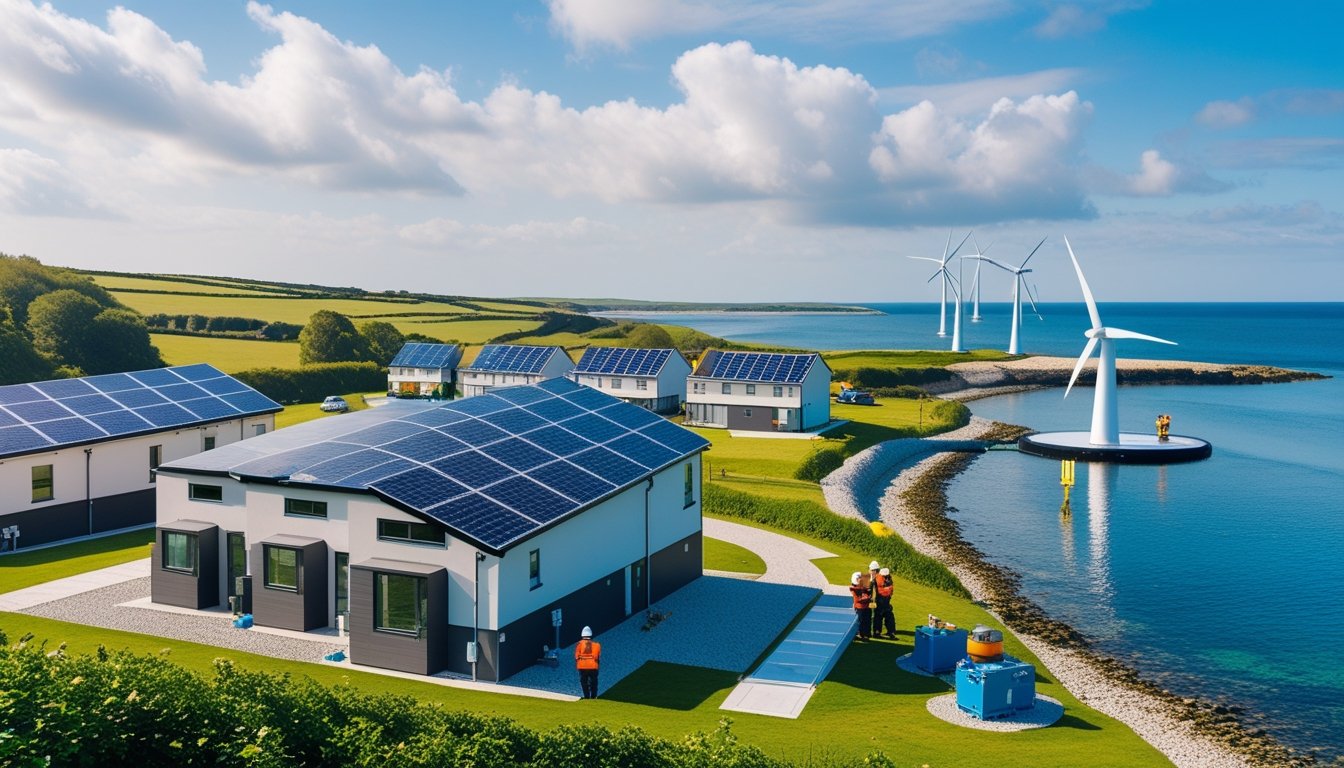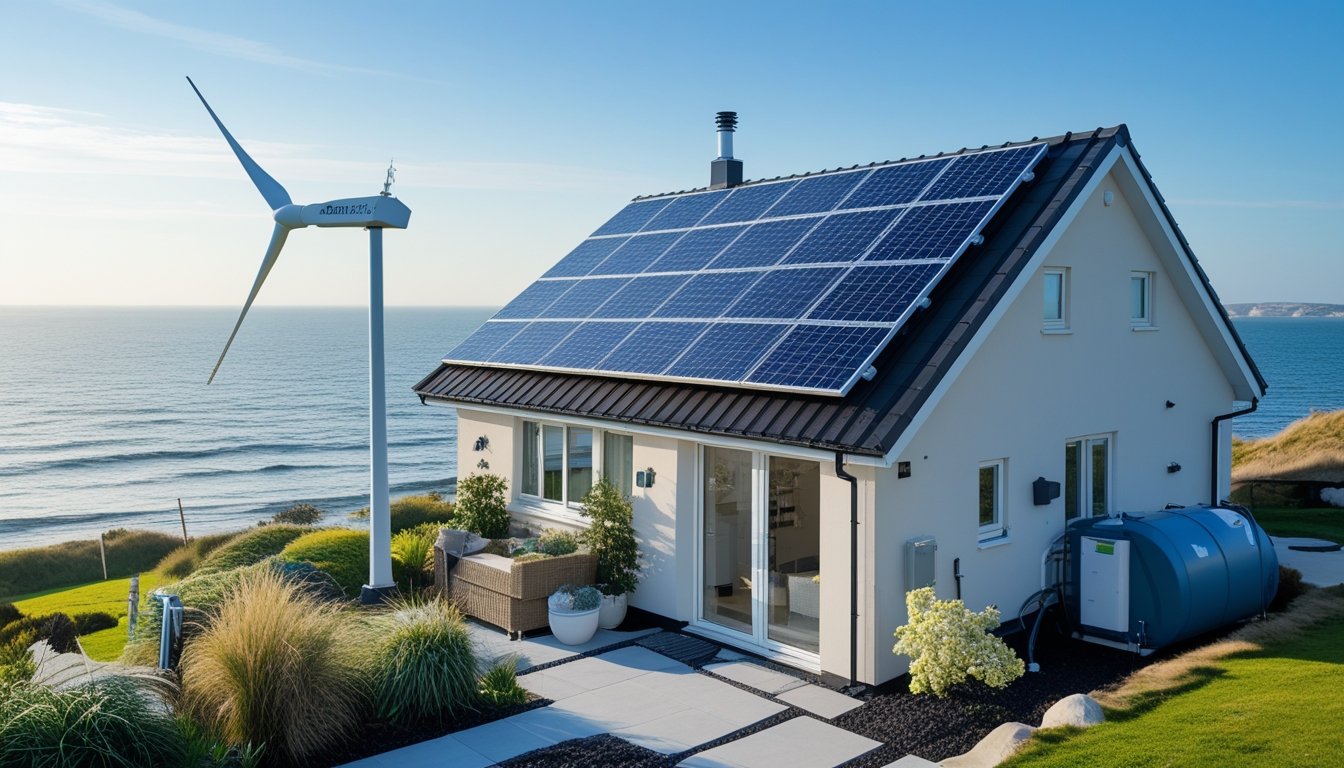Late updated: 12 May 2025 08:05
Written by: Eleanor Hartman
Sustainable Energy Solutions For Coastal UK Homes: Harnessing Wind and Solar Power
Sustainable energy solutions are becoming increasingly essential for homes across the UK, particularly in coastal regions that face unique environmental challenges. With the rising availability of innovative technologies, from solar panels to wind turbines, homeowners now have opportunities to reduce their carbon footprint and enhance their energy independence. Harnessing renewable energy sources can significantly lower energy bills while contributing to a cleaner environment.

As leaders in the push for sustainability, many coastal properties are adopting hybrid solutions that combine different energy technologies to maximise efficiency. This includes integrating solar thermal systems with wind energy or utilising heat pumps tailored for maritime conditions. Our dedication to greener living doesn't just benefit us; it paves the way for future generations to enjoy thriving, resilient ecosystems.
Key Takeaways
- Sustainable energy solutions can lower energy costs.
- Coastal homes benefit from hybrid renewable technologies.
- Energy independence supports environmental health.
Overview of Sustainable Energy Solutions for Coastal UK Homes
Coastal UK homes present unique opportunities for incorporating sustainable energy solutions. With the increasing push towards clean energy and reducing reliance on fossil fuels, it's crucial to explore viable renewable options specifically suited for these regions' distinctive geographical and environmental conditions.
Importance of Clean and Renewable Energy for Coastal Areas
Coastal areas in the UK are often at the forefront of climate change impacts. Rising sea levels and more frequent extreme weather events emphasise the need for resilient energy systems. By utilising clean energy, these areas can strengthen their sustainability profile.
Transitioning to renewable energy sources not only benefits the environment but also supports the local economy. Coastal regions can tap into natural resources like wind and solar, providing both energy security and economic incentives. Renewable solutions reduce carbon footprints, helping states and local communities towards achieving their net zero targets.
Challenges and Opportunities in Coastal UK Regions
Coastal UK regions face challenges such as salt corrosion and high maintenance costs for energy infrastructure. Additionally, the harsh marine environment can impact the longevity of some renewable technologies. There's also a need for substantial initial investments and community support to implement widespread sustainable schemes.
Despite these hurdles, integrating green energy systems provides significant benefits. Coastal areas are ideal for wind power projects due to strong, consistent winds, while solar technologies can be effective during summer months. The transition not only contributes to energy independence but also stimulates local job creation in the clean energy sector.
The Role of Offshore and Onshore Wind Power
Offshore and onshore wind power play a crucial role in the clean energy transition for coastal homes. Offshore wind farms, such as those developed by Ørsted, leverage the high wind speeds available at sea, creating vast amounts of renewable electricity. The output is more consistent, offering a reliable alternative to traditional power sources.
Onshore wind turbines complement offshore systems, especially in regions where installation is feasible. While development and maintenance can pose logistical challenges, advances in technology and local policymaking support continue to make wind a cornerstone of coastal energy strategies. Together, these projects significantly cut down on fossil fuel dependency and promote green energy.
Solar Panels and Biomass for Home Energy
In addition to wind, solar panels are a viable energy source for homes in coastal areas. Though limited by shorter daylight periods in winter, they provide a clean power solution during sunnier months. Installation is becoming increasingly cost-effective due to technological advancements and incentives aimed at promoting renewable energy adoption.
Biomass systems add another dimension to coastal energy solutions. They offer an efficient use of organic materials to produce heat and electricity, an option well-suited to rural coastal settings. Utilising locally sourced biomass reduces waste and reliance on external energy supplies, further bolstering the clean energy framework in coastal UK homes.
Key Technologies and Projects Transforming Coastal Energy

Our coastal energy landscape is rapidly evolving, thanks to various innovative technologies and projects. We are witnessing significant advancements in offshore wind farms, advanced heat pumps, and various renewable energy projects in the UK. These efforts not only aim to provide clean energy but also enhance sustainability and reduce carbon emissions.
Offshore Wind Farms and Major Coastal Projects
Offshore wind farms are a pivotal part of the UK’s renewable energy strategy. With projects like East Anglia One and East Anglia Two, developed by companies like Iberdrola and TotalEnergies, we are experiencing substantial contributions to clean energy.
The North Sea region serves as a crucial point for these projects, utilising cutting-edge offshore wind turbines that capture powerful winds to generate electricity. This location's favourable conditions have allowed for significant progress, positioning the UK as a leader in offshore wind energy.
Advanced Heat Pumps and Home Technologies
Heat pumps are transforming home energy solutions along the UK's coasts. These devices utilise external air or ground sources to efficiently heat or cool homes, providing a sustainable alternative to traditional gas or oil boilers.
New technologies in heat pumps allow for greater energy efficiency and lower greenhouse gas emissions. This innovation is crucial in reducing reliance on fossil fuels and aligning with the UK’s commitment to a low-carbon future. As adoption increases, heat pumps are expected to play an integral role in domestic energy management.
Case Studies: East Anglia and Scotland Initiatives
East Anglia and Scotland are leading examples of coastal energy innovation. In East Anglia, initiatives like East Anglia One have implemented offshore wind farms capable of powering hundreds of thousands of homes. This project represents a significant investment in renewable infrastructure.
In Scotland, projects like West of Orkney demonstrate similar commitment, harnessing the region's windy conditions. Both areas illustrate the successful integration of renewable resources into the local energy grid, setting benchmarks for environmental progress.
Impact of Renewable Energy Companies on UK Coasts
The contribution of renewable energy companies to the UK's coastline is profound. Firms such as Iberdrola and TotalEnergies drive numerous projects, creating jobs and fostering economic growth.
Their investment in Outer Dowsing and the extended coastal energy projects is critical for the region's switch to sustainable power. These companies not only supply cleaner energy but also lead research and development for future technologies, shaping the future of coastal energy in the UK.
Through collaboration and innovation, our coastal areas are advancing towards a greener tomorrow, paving the way for a resilient energy economy.
Frequently Asked Questions

Our coastal areas in the UK offer unique opportunities and challenges for adopting sustainable energy solutions. Residents in these regions can benefit from utilities such as offshore wind while also exploring grants and companies specialising in coastal installations.
What are the most cost-effective sustainable energy solutions for homes in coastal areas of the UK?
Homes along the coast benefit greatly from wind energy due to higher average wind speeds. Offshore and small-scale wind turbines are options worth considering. Solar panels also perform well in these areas, offering a complimentary energy solution that varies seasonally.
Which companies in the UK specialise in renewable energy installations for coastal residences?
Several companies in the UK focus on coastal and marine renewable energy projects. Names such as UtilityKing and Smart Energy Homes are known for their expertise in navigating the specifics of coastal installations, offering tailored solutions for these unique environments.
How can homeowners implement renewable energy solutions in their own coastal properties?
Homeowners should start by assessing their property's energy needs and natural resources, such as wind and sunlight. Consulting with experts for an energy audit can provide insights into the most effective technologies. Engaging with experienced installation companies ensures that the systems are well-suited and properly installed.
What renewable energy sources are most suitable for coastal climates in the UK?
Coastal homes often benefit from a combination of wind and solar power. Wind energy, harvested from both offshore and onshore turbines, complements solar panels. Additionally, tidal energy is another emerging option that can be effective, given the proximity to marine environments.
Can you provide examples of renewable energy systems that have been successfully integrated into coastal homes?
Many coastal homes successfully use solar panels paired with small wind turbines. In the North Sea region, properties utilise offshore wind resources effectively. A notable trend is the integration of battery storage systems, allowing residencies to store energy and manage their consumption efficiently.
What incentives are available for coastal UK homeowners looking to invest in renewable energy?
Coastal residents can take advantage of various UK government incentives such as the Smart Export Guarantee (SEG), which allows homeowners to sell surplus energy back to the grid. Regional grants and schemes might also be available, aimed specifically at promoting sustainable energy use in coastal and rural areas.